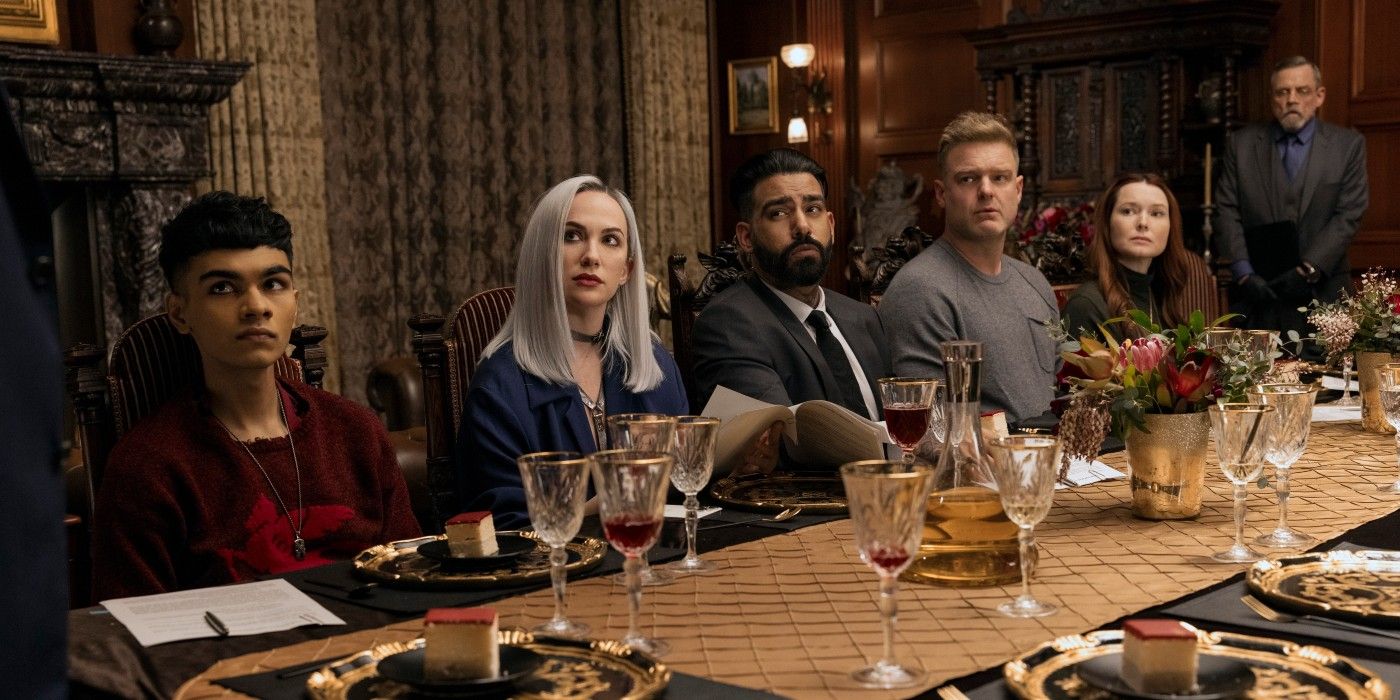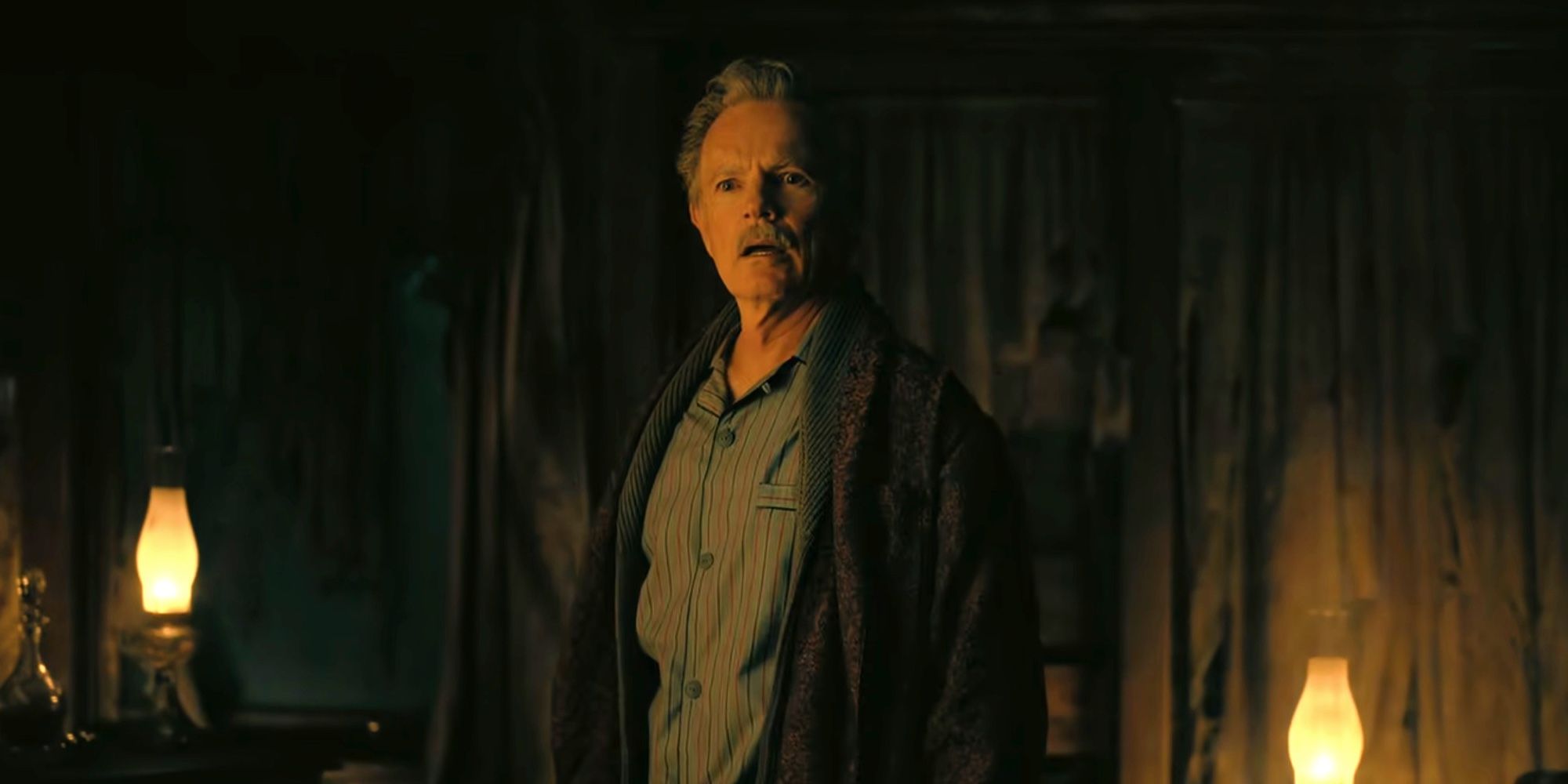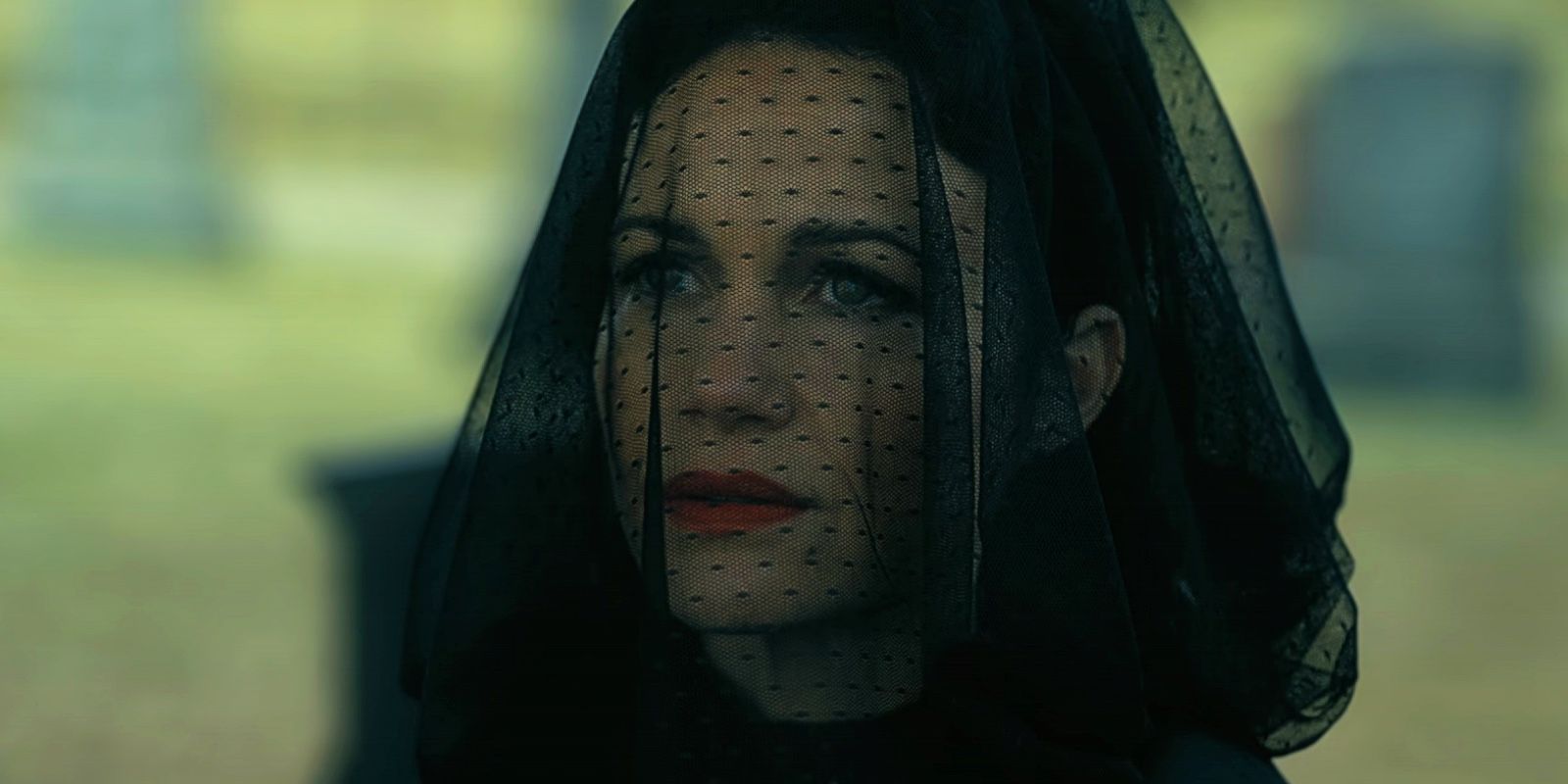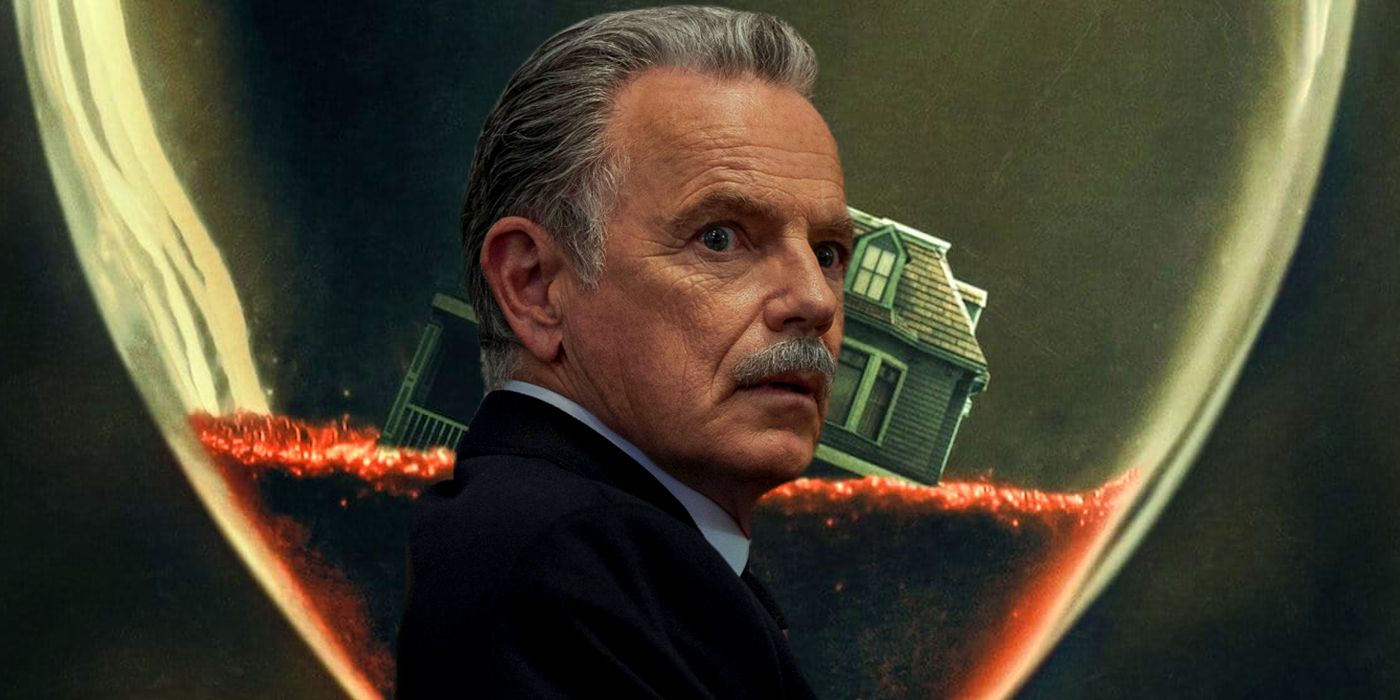WARNING! This article contains SPOILERS for The Fall of the House of Usher’s ending!
As is the case with many Mike Flanagan horror series, The Fall of the House of Usher’s tragic ending packs a punch in its exploration of family, greed, and consequences. Loosely based on the short story of the same name as well as various other Edgar Allan Poe stories, The Fall of the House of Usher journeys through the legacy and reckoning of the wealthy Usher family, led by corrupt Fortunato Pharmaceuticals CEO Roderick Usher. After decades of sitting on his throne with a massive fortune and no legal consequences, Roderick Usher’s family tree brutally perishes one by one, with each of his children and descendants paying the ultimate price for his sins.
By The Fall of the House of Usher’s ending, every Usher family member has died; from the kind-hearted Lenore to the abusive Frederick, anyone with Usher blood falls with Roderick. Their cruel fates are exacted by The Fall of the House of Usher character Verna, a shape-shifting demon with whom young Roderick & Madeline made a damning deal. After Roderick confesses that he knowingly climbed mountains of bodies to reach his wealth and power, he and his twin sister Madeline are crushed to death as their childhood home caves in. In The Fall of the House of Usher’s final moments, Auggie Dupin visits the Usher graves and Verna recites a poem, watching over the ashes of the fallen dynasty.
Why Everyone Died In The Usher Family: Verna’s Deal Explained

The death of every single Usher family member was the result of a deal that Verna made with young Roderick and Madeline Usher on New Year’s Eve 1979. After Roderick and Madeline killed his boss Rufus Griswold in order to rise up at Fortunato, the twins stumbled onto what they believed to be a bar run by a friendly bartender named Verna. Looking to stay all night as an alibi, the two ended up talking to Verna throughout the night, with the mysterious bartender ultimately offering them a tempting proposition. Verna informed Roderick and Madeline that she could give them everything they want – the CEO position, the titles of King and Queen of Fortunato, no legal consequences throughout their lives no matter the crime, and incomparable wealth – for a cost.
Carla Gugino’s House of Usher character Verna elaborated that she could grant them these wishes, but the next generation would pay the price. When Roderick died, the entire Usher bloodline would die with him – Madeline, his children, and any grandchildren included. While Roderick received a lifespan longer than any other Usher man, his children and heirs would have their privileged lives cut short. While the deal was made in the early hours of January 1, 1980, it wouldn’t be until November 2023 that Verna would uphold her end of the deal, as this was the time when Roderick succumbed to his terminal condition, CADASIL.
Verna confirmed in her deal that Roderick’s entire bloodline would die before him, so when his CADASIL progressed, she returned to fulfill the deal’s promise. In order, Verna collected the lives that Roderick handed to her: Perry, Camille, Leo, Victorine, Tamerlane, Frederick, Lenore, Madeline, and himself. It didn’t matter whether the characters actually bore his last name or even if they were good, kindhearted people who were opposed to Roderick’s prideful sins and the traps of power and wealth – anyone with a drop of Usher blood was condemned to death by Roderick on that fateful night 43 years prior.
Roderick Usher’s Final Line Explained: “Nevermore”

Just before his childhood home cracks and caves in on top of him, Roderick utters the word “nevermore.” This line is famously associated with Edgar Allan Poe’s poem “The Raven,” as the word is repeatedly said by the titular bird as a way to taunt the protagonist. In the poem, the narrator laments the loss of his love Lenore, which parallels Roderick mourning the loss of his good-hearted granddaughter Lenore on account of his own actions. The poem’s narrator ultimately questions whether he will be reunited with Lenore in death, to which the raven replies, “nevermore.” At the end of “The Raven,” the narrator cries out that his soul will be “lifted nevermore,” indicating a pessimistic fate of eternal grief and sadness.
Though Lenore was already dead, Roderick had been receiving texts from an AI version of her all night, simply repeating the word “nevermore” in various forms. Roderick then says “nevermore” as his sister Madeline – whom he believed he already killed – attacks him, repeating the same demises as their mother and father over 60 years before. As Madeline and Roderick perish in the same way their empire began, he ominously experiences a full-circle reckoning for his family legacy. Nevermore will this happen in the Usher family; nevermore will Roderick take the lives of innocents for his own gain; nevermore will the Ushers experience the grief, pride, and greed that made and ruined them – as it falls with Roderick and Madeline in that exact moment.
Verna’s “Spirits Of The Dead” Poem Explained

In The Fall of the House of Usher’s ending, Auggie visits the Usher family’s gravestones to inform them what became of the world after their departure: Auggie retired, Juno stopped taking Fortunato’s Ligodone drug and inherited Roderick’s fortune, Fortunato was dissolved with every dollar being spent on addiction recovery and research, and Arthur spent the remainder of his life in prison. After Auggie walks away, Verna recites an eerie poem at the cemetery while placing items on each gravestone that represent what ultimately caused their demise. The lines spoken by Verna come from Edgar Allan Poe’s “Spirits of the Dead” poem:
“Thy soul shall find itself alone
’Mid dark thoughts of the gray tombstone—
Not one, of all the crowd, to pry
Into thine hour of secrecy.
Be silent in that solitude,
Which is not loneliness—for then
The spirits of the dead who stood
In life before thee are again
In death around thee—and their will
Shall overshadow thee: be still.
The night, tho’ clear, shall frown—
And the stars shall look not down
From their high thrones in the heaven,
With light like Hope to mortals given—
But their red orbs, without beam,
To thy weariness shall seem
As a burning and a fever
Which would cling to thee for ever.
Now are thoughts thou shalt not banish,
Now are visions ne’er to vanish;
From thy spirit shall they pass
No more—like dew-drop from the grass.
The breeze—the breath of God—is still—
And the mist upon the hill,
Shadowy—shadowy—yet unbroken,
Is a symbol and a token—
How it hangs upon the trees,
A mystery of mysteries!”
The poem is meant to explore the beauty that comes with death, while placing man and nature as holistic rather than separate entities. While lamenting about the mysterious nature of death and passing over from life to the afterlife, Poe’s poem warns against romanticizing it. The world and life are filled with mysteries, but death proves to be the most puzzling of all. The poem also emphasizes that while people may be lonely in life, they are not so in death.
Connecting to the deaths of the Usher family, each of them was lonely in some way; before Camille died, she explained that the lack of their father’s affection left a lonely hole in each of their hearts that they could never fill. In life, they were focused on pride, greed, and power that ultimately left them hollow, always in competition, and alone, but now that they lie together in death, they can actually be a family without such isolating limitations. Their endless aspirations and hopes for more became the sources of their downfall, but death will bring the Ushers the peace and unity they never obtained in life.
What’s The Meaning Of The Fall Of The House Of Usher?

The meaning of The Fall of the House of Usher warns against the traps of power, the sins of pride and greed, and the tragedies that often befall families. Roderick Usher sold his family – at a time when they were all innocent – for wealth, power, and no consequence for his actions. In doing so, he sealed their fates to a cruel demise that proved such a deal was never worth it for any of them. Piles of money and privilege aren’t fulfilling for life, and Roderick’s selfish pursuit of this cost the world millions of lives, tragedies, and heartbreak. For his own personal gain, Roderick condemned millions of innocents to horrible fates.
As exemplified in the character of Annabel Lee, Roderick was as wealthy and happy as he would ever be when he had no money. Roderick may have ended his life with billions of dollars, but he also had no love, no goodness in his heart or his children, no respect from the world, and no lasting legacy after his death. In reality, Roderick would have lived a happy life with a wealth of love and kindness had he lived humbly with Annabel Lee, Frederick, and Tamerlane. Instead, Roderick chose his pride, which corrupted his heart, his children, and any money or status he would ever earn.
The Fall of the House of Usher’s message warns that obtaining massive wealth is equivalent to making a deal with the devil. In order to keep their empire, people will abandon their morals, ethics, and humanity. With generational wealth being passed down, this pursuit of wealth and obtaining it condemns entire families to the same grim life and legacy. Even if Roderick died and his heirs lived, he would have passed on his cursed mindset to his children, and then their children – even Lenore would be stained by the evil that came from the Usher family’s money and actions, regardless of her efforts to use it for good.
When greed, money, pride, and power become the metrics for “love” and approval in a family, they’re doomed. Even though Auggie lied about there being an informant in House of Usher, the family didn’t hesitate to coldly turn against one another. Including Lenore and Annabel Lee, not even the good can survive when such a poison has infiltrated the bloodline. Only in death, when such efforts are meaningless, is there a semblance of hope for the Ushers to be together as one. From the moment Roderick chose his personal career and money over his family and morals, The Fall of the House of Usher’s titular fate was sealed.




